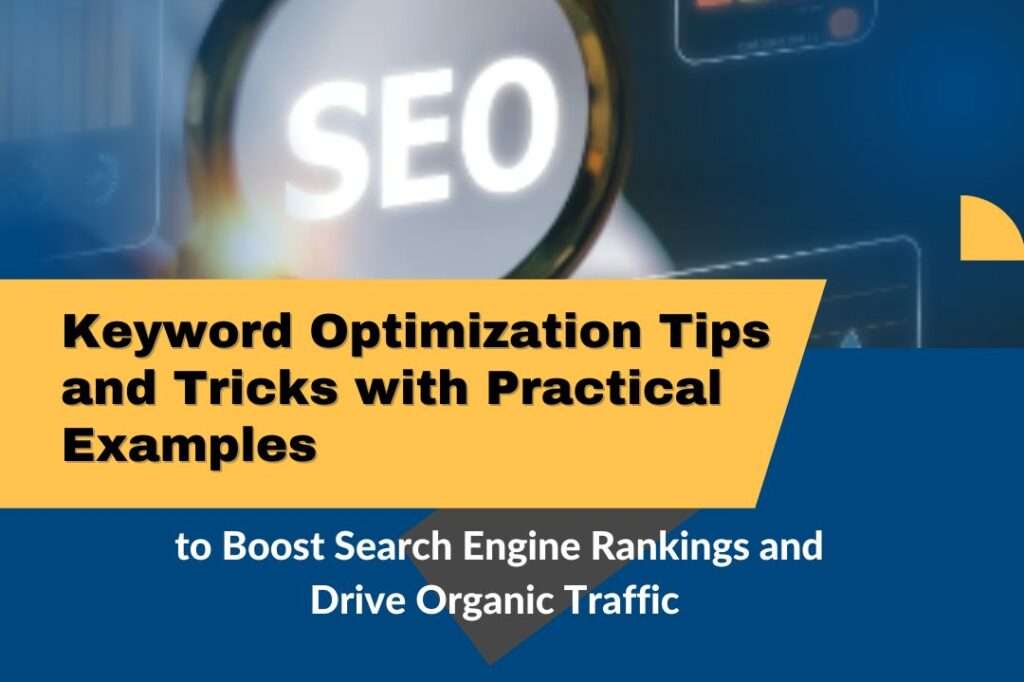Keyword Optimization Tips and Tricks: Practical Examples to Boost Search Engine Rankings and Drive Organic Traffic
Are you looking to enhance ur website’s visibility and attract more organic traffic? Keyword optimization is an essential aspect of search engine optimization (SEO) that plays a vital role in improving your website’s search engine rankings. In this comprehensive guide, we will explore various keyword optimization tips and tricks and provide practical examples to help you implement them effectively.

Understanding the Importance of Keyword Optimization
Before delving into practical tips, let’s understand why keyword optimization is crucial for your website’s success. Keywords are the foundation of any SEO strategy, acting as the bridge between what people are searching for and the content you offer. By optimizing your content with relevant keywords, you can improve your website’s visibility in search engine results pages (SERPs), drive organic traffic, and ultimately, enhance your online presence.
Practical Examples of Keyword Optimization
1. Add Your Main Keyword Early On In Your Content:
· Suppose your main keyword is “best chocolate cake recipes.” Incorporate this keyword in the title, meta description, and within the first few sentences of your content. For instance, “Indulge in Irresistible Delights: The Best Chocolate Cake Recipes to Satisfy Your Sweet Cravings.”
2. Write Unique Titles, Descriptions, and Content:
· Ensure that your titles and meta descriptions are unique and compelling. For example, “Unleash Your Creativity: DIY Home Decor Ideas for a Cozy Living Space.”
3. Optimize Your Title Tag for SEO:
· Craft attention-grabbing titles that effectively convey the purpose of your content. For instance, “Unveiling the Secrets of Perfectly Grilled BBQ: Expert Tips and Lip-Smacking Recipes.”
4. Improve Your Site’s User Experience:
· Create valuable and engaging content that provides solutions to your audience’s queries. Focus on enhancing user experience through easy navigation and visually appealing layouts.
5. Optimize Your Site’s Loading Speed:
· Ensure that your website loads quickly to offer a seamless browsing experience for visitors. Use tools like Google’s PageSpeed Insights to identify and rectify speed-related issues.
6. Track Your Results With Google Search Console:
· Utilize Google Search Console to monitor your website’s performance, identify keyword opportunities, and track your search appearance.
Implementing SEO Best Practices
To enhance your keyword optimization efforts and boost your search engine rankings, here are some best SEO practices to consider:
- Conduct thorough keyword research to identify high-traffic, low-competition keywords related to your content.
- Incorporate long-tail keywords strategically to target niche audiences and improve your chances of ranking for specific search queries.
- Focus on creating high-quality, original content that addresses user intent and provides valuable insights.
- Utilize internal linking to guide users to relevant content within your website and boost your overall SEO strategy.
In conclusion, effective keyword optimization is pivotal for improving your website’s search engine rankings and attracting organic traffic. By implementing the practical tips and examples provided in this guide, you can elevate your SEO strategy and establish a strong online presence. Remember to consistently monitor your website’s performance, adapt to evolving SEO trends, and prioritize creating user-centric content to achieve sustainable success in the digital landscape.
By following these tips, you can effectively optimize your website for search engines, enhance user engagement, and drive organic traffic, leading to greater online visibility and success.

